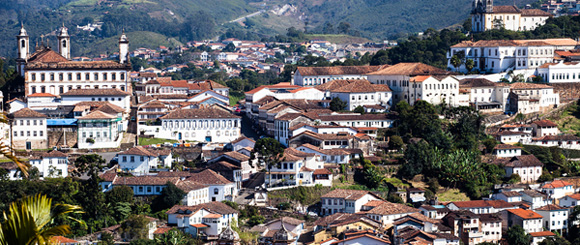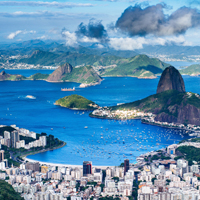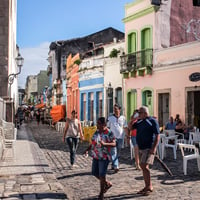15 Expats Talk about Health Insurance and Healthcare in Brazil
Last updated on Apr 03, 2023
Summary: The quality of medical care in Brazil is generally considered to be good, although it is not as advanced as the medical care available in the United States. Emergency services are generally reliable and ambulances can be called by dialing 192. In some areas, private ambulances may also be available.

How are healthcare services Brazil?
When we asked expats and global nomads about the quality of medical care in Brazil, they replied:
"Brazil does have a National Health Care program and my wife and I have taken advantage of this service for relatively minor health issues. But it is a national health care program that must be funded by the government with many cities such as Rio de Janerio unable to fund many of these clinics and public hospitals to the degree that they should be. We are retired and our health issues are relatively minor but we feel strongly about having a paid for medical insurance plan. This plan pays for annual physicals that include treadmill stress test, visit with cardiologist, Urologist, blood tests and a personal consultation with your doctor about the results. Mine lasted nearly a full hour. We looked for a doctor who spoke English and was very good in his/her field. We chose a private practice doctor in Natal, Brazil who performed his studies under the direction of Dr. Christian Bernard in South Africa. So my advice.......live in or near a big city such as Natal, Brazil, spend some time talking with insurance agents about doctors and qualifications in your area and do not depend only on the national social medicine programs. Purchase private medical insurance. Mine is from AMIL who's parent company is United Health Care," remarked one expat living in Natal.
"Healthcare services in Brazil are provided by both public and private institutions. The public healthcare system is known as the Unified Health System (SUS) and is funded by the government. It provides free healthcare to all citizens and permanent residents, including foreign residents. The quality of public healthcare varies from region to region, with some areas having better access to resources and better quality care than others. Expats in Brazil can use the public healthcare system, but they may need to pay for some services. Private healthcare is also available and is often preferred by expats due to its higher quality of care. Private healthcare is usually more expensive than public healthcare, but it can provide more comprehensive coverage and access to better facilities," said one expat living in Brazil.
What are medical services in Brazil like?
When we asked expats and global nomads about the quality of medical care in Brazil, they replied:
"Brazil has a comprehensive public health system, providing free medical care to all citizens. Private health care is also available, and is often of a higher quality than public health care. Brazil has a large number of hospitals, clinics, and medical centers, and many of them are well-equipped and staffed with experienced professionals. Brazil also has a number of specialized medical centers, such as cancer treatment centers, and centers for the treatment of infectious diseases. In addition, Brazil has a number of medical research centers, which are dedicated to researching and developing new treatments and technologies," commented one expat living in Brazil.
"Compared to the US, is cheap and for "normal" health problems as good as if not better than the US, however, I have been away from the US for such a long time, my opinion may be very relevant," wrote one expat.

Oliveira Lawyers is the foremost Brazilian law firm dedicated to representing the interests of foreign citizens in Brazil. From immigration to real estate and other life events, our bilingual attorneys got you covered! Main services include immigration, real estate, notary services, tax services, collections, family law, and litigation.

Oliveira Lawyers is the foremost Brazilian law firm dedicated to representing the interests of foreign citizens in Brazil. From immigration to real estate and other life events, our bilingual attorneys got you covered! Main services include immigration, real estate, notary services, tax services, collections, family law, and litigation.
Are healthcare and health insurance expensive in Brazil?
"Healthcare and health insurance in Brazil can be expensive, depending on the type of coverage and services needed. Private health insurance plans are available, but they can be costly and may not cover all medical expenses. Public health insurance is available to those who qualify, but it may not cover all medical expenses either. Additionally, many medical services and treatments are not covered by either public or private health insurance plans, and these can be expensive," said an expat in Brazil.
"For us, medical insurance in Brazil is cheaper than medical insurance in the USA. I have no deductibles and my insurance cost is about 1/2 of what it would cost me for insurance in the USA. We are in our early 60's and pay about $1,400 per month (for both of us) compared to a similar plan (higher end plan) in the USA at $2,400 per month for both of us. This Brazilian plan has paid in full our complete annual physicals and lab tests and we have had several other visits where the insurance paid 100% with no problems with the insurance company," commented one expat living in Natal, Brazil.
 Oliveira Lawyers
Oliveira LawyersGet Quote
Oliveira Lawyers is the foremost Brazilian law firm dedicated to representing the interests of foreign citizens in Brazil. From immigration to real estate and other life events, our bilingual attorneys got you covered! Main services include immigration, real estate, notary services, tax services, collections, family law, and litigation.
 Oliveira Lawyers
Oliveira LawyersOliveira Lawyers is the foremost Brazilian law firm dedicated to representing the interests of foreign citizens in Brazil. From immigration to real estate and other life events, our bilingual attorneys got you covered! Main services include immigration, real estate, notary services, tax services, collections, family law, and litigation.
Get Quote
What are emergency services like in Brazil?
When we asked about emergency services, members in Brazil wrote:
"Emergency services in Brazil are generally reliable and efficient. In the event of an emergency, the best way to call for an ambulance is to dial 192, which is the national emergency number. This number is free of charge and is available 24 hours a day, 7 days a week. Ambulances are typically staffed with trained medical personnel and are equipped with the necessary medical supplies and equipment," commented one expat living in Brazil.
"I live in Praia de Pipa, Brazil and small fishing/tourist village on the Coast of NE Brazil. Pipa is located in the State of Rio Grande do Norte and is about 64 km from Natal by car (hour drive). Tabau do Sol is the city with Pipa listed as a suburb and is located about 5 km away. Tabau has an emergency room and doctors 24/7 and the city operates 2 or 3 ambulances from the clinic. This is a public clinic and no charges are made for treatment of patients. My wife, myself and some other foreigners living in the area use this facility and they are very professional and the doctors appear competent. This facility does have the staff and equipment to accept critical care patients but they do ship them off to a hospital in Natal once the patient is stable. The nearest hospital is in Natal. There are a number of public and private hospitals in Natal but we have not had to use either of these in the 2 years since we moved to Brazil," wrote one expat.

Oliveira Lawyers is the foremost Brazilian law firm dedicated to representing the interests of foreign citizens in Brazil. From immigration to real estate and other life events, our bilingual attorneys got you covered! Main services include immigration, real estate, notary services, tax services, collections, family law, and litigation.

Oliveira Lawyers is the foremost Brazilian law firm dedicated to representing the interests of foreign citizens in Brazil. From immigration to real estate and other life events, our bilingual attorneys got you covered! Main services include immigration, real estate, notary services, tax services, collections, family law, and litigation.
Will I need to travel to see a specialist?
"Brazil offers an array of highly qualified medical specialists in a variety of cities and areas throughout the country. Sao Paulo, the largest city in Brazil, is home to one of the best selections of specialized medical professionals. Rio de Janeiro is also home to a number of excellent hospitals and clinics, many of which are staffed with highly skilled medical personnel. The capital city of Brasilia is also home to many medical specialists, as well as a variety of specialists who focus on providing personalized care. Other cities and areas of Brazil with a reputation for great medical care include Belo Horizonte, Florianopolis, and Porto Alegre," commented one expat who moved to Brazil.
"Natal, Bazil has a number of specialists for a range of health issues that you would normally find in a large city. My doctor is a Cardiologist who is well trained and enjoys a very good professional reputation. But doctors here take on patients regardless of their specialty. My wife has had some skin issues requiring specialist in dermatology and some out-patient surgeries. Excellent care and facilities with many of these doctors do speak English. All covered by our paid for insurance," said one expat.
Are common prescription medications available in Brazil?
"There is a pharmacy on every street corner of almost every city in Brazil so finding a pharmacy is no problem. I do take prescription medications and on my first visit with my new doctor he made it clear that the meds I was taking from the USA were out-dated and better meds were available. He switched my prescription and these meds are readily available at all the pharmacies that I have been to. It is hard to beat the USA $4.00 prescription program for a long list of certain meds. But buying the medications here have shown to be readily available and cheaper (not considering the USA $4.00 meds) than my home country," remarked one expat living in Natal.
"Yes, common prescription medications are available in Brazil. Most medications are available in pharmacies, and some are available over the counter. In addition, many medications are available through online pharmacies. Brazil also has a national health system, which provides access to medications for those who cannot afford them," said one expat living in Brazil.
Do you have anything more to add about local medical facilities in Brazil?
"The quality of medical facilities and medical care in Brazil vary greatly, depending on the location and type of service. Overall, Brazilian health services are often considered to be accessible and of satisfactory standards. Many of the major public and private hospitals in Brazil provide reliable and comprehensive medical care, including diagnostic, specialist and therapeutic services. In Brazil, preventive health care, such as immunizations, is given priority, and many medical centers and health posts are available for individuals and families to access basic health care services. Furthermore, professional medical associations often provide information about accredited medical practitioners in Brazil," mentioned one expat in Brazil.
As a foreigner living in Brazil, will I have access to public healthcare? What is it like?
"Yes, foreigners living in Brazil have access to public healthcare. The public healthcare system in Brazil is known as the Unified Health System (SUS) and is funded by the government. It provides free healthcare services to all citizens and legal residents, including foreigners. The quality of care provided by SUS varies from region to region, but overall it is considered to be of good quality. SUS also provides access to specialized care, such as cancer treatment, and has a network of hospitals and clinics throughout the country," commented one expat who moved to Brazil.
What have your experiences during the pandemic with the local healthcare system been like?
We asked expats in Brazil if they have access to public healthcare in Brazil. And, if they do have access, what is it like. They wrote...
"The pandemic has had a significant impact on the healthcare system in Brazil. Many hospitals have been overwhelmed with the influx of patients, leading to long wait times and limited access to medical care. Additionally, the lack of resources has caused a shortage of medical supplies, such as masks and gloves, which has further hindered the ability of healthcare workers to provide adequate care. Furthermore, the government has been slow to respond to the crisis, leaving many people without access to the necessary treatments and medications. Despite these challenges, the healthcare system in Brazil has been resilient and has managed to provide care to those in need," said one expat.
"I got a test that took a week to render the result. There are too many people believing in rumors and not science," remarked one expat in Vila Velha.
What advice do you have for expats having a baby in Brazil?
We asked expat moms who gave birth in Brazil about their experiences and advice they have for other moms to be. They said:
"I chose to give birth in this hospital as it was a maternity one and they had all the facilities to take care of mom and baby. I made sure that they had ICU facilities for me and my baby if they were necessary. I was told that there is another good maternity hospital called CASA de SAO JOSE," remarked one expat in Rio de Janeiro.
"Ensure you have obtained a valid visa before your arrival to Brazil, as having a baby as an expat requires specific paperwork. Research the Brazilian healthcare system and consider whether private or public care is better for you and your family. Investigate which doctors offer high quality care in the city or region of your current residence. Make sure to have all relevant medical documents translated into Portuguese, such as previous medical records and immunization records. Familiarize yourself with the Brazilian healthcare system and do research on the healthcare benefits offered by the Brazilian government to citizens and expats. Prepare for the extra paperwork that is required when delivering a baby in Brazil. Lastly, ensure you have chosen a secure neighbourhood to raise your baby in as crime rates can be high in some areas of the country," explained one expat living in Brazil.
Are healthcare services good in Brazil?
We asked people if they have access to good medical care in Brazil. They wrote:
"We use the state medical system and have found it to be satisfactory. Although some of the services aren't included, it is affordable. For example, a mammogram is circa $40," wrote a person living in Taiba.
"Healthcare services in Brazil are generally provided free of charge to citizens through the public system known as SUS (Sistema Único de Saúde). Private healthcare is also available for those who can afford it. Healthcare facilities in Brazil provide adequate and modern medical treatments, with many hospitals offering advanced medical technology and treatments. The country has a well-developed network of primary care, emergency services, and specialty clinics that provide comprehensive medical care and access to specialist care. Vaccination programs have also been effective in controlling and preventing various diseases. Despite these benefits, Brazil faces several challenges in providing quality healthcare services to underserved populations and across rural areas, where access to medical care is more limited," explained one expat living in Brazil.
About the Author
 Betsy Burlingame is one of the founders of Digital Nomad Exchange and the Founder and President of Expat Exchange. She launched Expat Exchange in 1997 as her Master's thesis project at NYU. Prior to Expat Exchange and Digital Nomad Exchange, Betsy worked at AT&T in International
and Mass Market Marketing. She graduated from Ohio Wesleyan University
with a BA in International Business and German.
Betsy Burlingame is one of the founders of Digital Nomad Exchange and the Founder and President of Expat Exchange. She launched Expat Exchange in 1997 as her Master's thesis project at NYU. Prior to Expat Exchange and Digital Nomad Exchange, Betsy worked at AT&T in International
and Mass Market Marketing. She graduated from Ohio Wesleyan University
with a BA in International Business and German.
Some of Betsy's articles include 12 Best Places to Live in Portugal, 7 Best Places to Live in Panama and 12 Things to Know Before Moving to the Dominican Republic. Betsy loves to travel and spend time with her family. Connect with Betsy on LinkedIn.

Oliveira Lawyers is the foremost Brazilian law firm dedicated to representing the interests of foreign citizens in Brazil. From immigration to real estate and other life events, our bilingual attorneys got you covered!
Get Quote
 Oliveira Lawyers
Oliveira LawyersOliveira Lawyers is the foremost Brazilian law firm dedicated to representing the interests of foreign citizens in Brazil. From immigration to real estate and other life events, our bilingual attorneys got you covered!
Get Quote
![]() Brazil Forum
Brazil Forum
Talk with other digital nomads and expats in Brazil on our Brazil forum - meet people, get advice and help others.
![]() Contribute
Contribute
Help others in Brazil by answering questions about the challenges and adventures of living in Brazil.
Digital Nomads in Brazil offer advice about healthcare, hospital visits, emergency rooms visits, finding a doctor and buying health insurance in Brazil.
Advice for people renting and buying real estate in Brazil.



